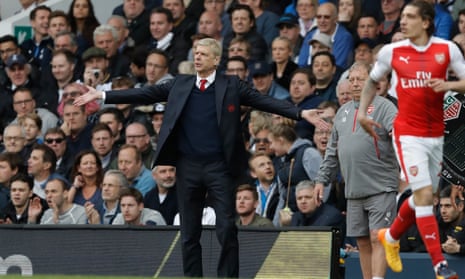Arsène Wenger believes managers publicly criticising players – a tactic frequently used this season by José Mourinho – can be damaging to team unity and dangerous for footballers’ mental health.
Chris Smalling, Phil Jones, Anthony Martial, Marcus Rashford and, most frequently, Luke Shaw have been singled out for criticism by the Manchester United manager this season. Wenger, meanwhile, has not only refused to give in to the temptation to publicly castigate his charges but has passionately defended them at their moments of greatest crisis, saying after the 5-1 Champions League defeat to Bayern Munich that his players had been “unjustifiably criticised”.
Wenger, whose Arsenal face United at the Emirates on Sunday, said: “You cannot always say to the players: ‘We are all on the same boat,’ and: ‘We are all in this together,’ and then you jump out of the boat and say: ‘It’s your fault now.’ But when it goes well you take credit. You’re in a position where you have to be part of it and fight for them as well when it doesn’t go well.”
On Thursday, Wenger had spoken about mental health issues in football, an issue of particular concern this week after the detention of the Everton winger Aaron Lennon by police under the Mental Health Act. The Arsenal manager said: “Players suffer with self-esteem in certain situations, because the expectations for them are very high. Their families, their agents … the pressure is very big. It’s not easy to deal with that at a very young age.”
Wenger referred to these words when discussing the public criticism of players. “Look, ideally you have to be careful, you cannot do that in every single game,” he said. “You can do that in extreme situations sometimes but it has to be handled carefully. I spoke before about the players dealing with stress. It just makes that stress level worse for them. Top players have a good objective assessment of their performances. They know well where they stand.”
That is not to say that the Frenchman has never been tempted to turn on his teams but he believes that significant issues are best dealt with in private, trying where possible to avoid bringing them up even in the dressing room. Last year Gilberto Silva, the Brazilian midfielder who played under Wenger between 2002 and 2008, praised Wenger’s style in this respect. “Arsène identified the area in which I needed to improve my game and he came to me in a very good way to tell me this,” he said. “We spoke privately, without anyone else knowing. I think this is a very good way of managing. I have seen some managers expose their players in front of the others at training or say something publicly. He never did that with me.”
“Of course sometimes I have to bite my lip,” Wenger said. “Like you have to do it in your job, everywhere, you know? That’s part of the job of a manager. You cannot always speak out, you have to control what you say. There are times I have been tempted, of course, but most of the time [the manager is] responsible for the result so you’re first disappointed with yourself.”
Wenger has been dealing with disappointment again this week, following a comprehensive 2-0 defeat to Tottenham in last Sunday’s north London derby. Having dropped out of the top four at the end of February, their hopes of a return before the end of the season now hinge on victory against United. In the last two decades Arsenal have never finished outside the top four while United have done so twice; this year one of them looks likely to finish sixth, the position Arsenal currently occupy with five matches remaining. Defeat this weekend would almost seal their fate, though Everton could yet relegate them into seventh. “If we want to achieve our targets we have no choice,” Wenger said. “We have to beat United.”
Wenger also ridiculed the idea that his players have faltered because of a lack of desire. “People always feel it doesn’t mean enough for them when you don’t win, you know,” he said. “That’s not true. You’re not at a big club and you think it doesn’t matter do I win or not win. It matters for them and they care. We have to use that frustration and to transform it into a positive energy. That’s our target and that’s what we want to see on Sunday.”
